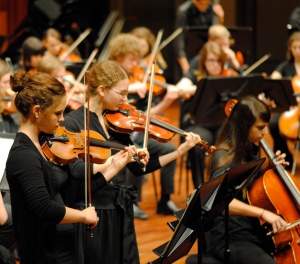Home » Philosophy
Category Archives: Philosophy
Meditation 101
Meditation has been a big part of my life for my entire adulthood, like a personal mountain I have been climbing a step at a time, nearly every day, for forty years.
Wholehearted Attention, November 12
Thursday, November 12, 7 pm
A discussion with Walter Bitner, Dr. Ronald Crutcher, and Alex Laing
Music plays a unique and important place in our culture and an understanding and appreciation of music is a hallmark of the educated person. Beyond the content of the music curriculum however, there is something fundamentally different about the process of music-making from the way most other subjects are taught in school that is of immense value to the successful education of dynamic, flexible, and responsive individuals. Music students must simultaneously perform a complex set of operations that call on more aspects of the human being than any other activity they face in school.
At its best, musical performance demands a wholehearted attention from the participant, a complete absorption in the moment in which all other thoughts and concerns disappear.
Read the original article here.
Making Music During the Pandemic
This article posted today, March 17, 2020, on my ChoralNet blog. I think it’s worth reposting here.
* * *
These are uncertain times. The current COVID-19 pandemic has disrupted everyone’s lives, and we are facing a period of time in which much of what we did regularly – our daily and weekly routines – has been impacted.
 For choral singers and choral directors, this means the cancelation of classes, rehearsals, performances, services, and the other activities of our lives that involve gathering together to make music. These social activities now on hiatus are in many cases the reason we got into this work – making music with others is a kind of lifeline, a way to connect with not only others and the world, but with the deepest, internal parts of ourselves. (more…)
For choral singers and choral directors, this means the cancelation of classes, rehearsals, performances, services, and the other activities of our lives that involve gathering together to make music. These social activities now on hiatus are in many cases the reason we got into this work – making music with others is a kind of lifeline, a way to connect with not only others and the world, but with the deepest, internal parts of ourselves. (more…)
Universal Music Education

Nashville School of the Arts Festival Choir in performance, May 13, 2013, Blair School of Music, Vanderbilt University, Nashville (click images to enlarge)
As we enter the third decade of the twenty-first century, the time has come for music educators to stop pussyfooting around and advocate for Universal Music Education. Indeed, it is long past time. We should stop wasting valuable time – time that belongs to us and to the children in our care – we should stop seeking compromise solutions that merely seek to preserve music education’s place in school curriculums, a place that is in most cases completely upside-down, a place that has fallen into neglect and disrepute over that last decades, a place that was rarely or never ideal in the first place. It is time to advocate for what is truly needed by our children and our society: a comprehensive music education for every child in every school.
Walter’s Working Model
Walter’s Working Model
of the human being, the universe, and everything
with a view towards a philosophy of education
Inspiration and Music Education

Nashville School of the Arts Early Music Consort performs at Blair School of Music, Vanderbilt University, Nashville, May 13, 2013 (click images to enlarge)
In the contemporary climate of data-driven education, you don’t hear much about inspiration in the popular rhetoric about music education and its role and purpose in the lives of children. But in fact the music teacher’s most important responsibility is to inspire her students.
The Continuum

The Music of the Spheres, from Practica Musice by Franchinus Gaffurius, Florence, 1496 (click images to enlarge)
Music has been a part of human life for as long as we know. It fascinates me that we live in a time when advances in technology and the efforts of musicologists and musicians have made it possible to learn about, study, listen to, and learn to perform music from a vast profusion of times and cultures – far beyond what was possible in the past.
My Secret Experiment in Music Education

Continued from: Is Music a Sport?
In June 2007, I founded Music City Youth Orchestra with Tracy Silverman and a group of ten students, and I served as MCYO’s music director and de facto executive director until I resigned in August 2012. For more than five years, MCYO occupied my attention nearly every day as I worked to grow and develop the ensemble artistically: I conducted all of the orchestra’s auditions, rehearsals, and performances, chose and arranged repertoire and prepared it for rehearsal, contracted venues, generated publicity, recruited students, soloists, and adult musicians and educators to assist us. I recruited board members and we established the organization as a 501(c)(3) nonprofit; I filed paperwork, conducted meetings, sought funding, and served as the organization’s sole administrator for the first four years of operation. During most of this time I was concurrently both a full-time high school teacher and attending graduate school. It was an exciting and exhausting time.
What many do not know – I never articulated this plainly to anyone while I was involved with MCYO, and only came clean about this in conversations with a few former MCYO students and friends in recent years – is that during those five years I pursued a secret educational agenda in my work with the students. Music City Youth Orchestra was the grand experiment of my teaching career in which I put to the test some of my most deeply held convictions about the value and promise of music education in the lives of children.
(more…)On The Dark Side of the Moon Part 3
 continued from
continued from
On The Dark Side of the Moon
Part 2
The Dark Side of the Moon
Side B
Money
The sound effects loop that Roger Waters made in his garden shed from coins jangling, paper ripping, and other cash-related sounds begins the B side of The Dark Side of the Moon, followed almost immediately by Water’s driving bass line – one of the most distinctive and instantly recognizable in the history of rock. Money was Pink Floyd’s most successful single from the album, and like many rock hits, it is based on a twelve-bar blues. The resemblance ends there, however: Money is set in the dark and serious key of B minor, with seven beats to the bar.
Money‘s three verses are a cocky paean to greed, a caricature of capitalist values. Waters lays the irony on thickly: clearly living one’s life in pursuit of money for its own sake or for the luxuries that great wealth can bring may interfere with the attempt to live consciously. Do greed and a distraction with materialism proceed from the irrational part of human nature?




